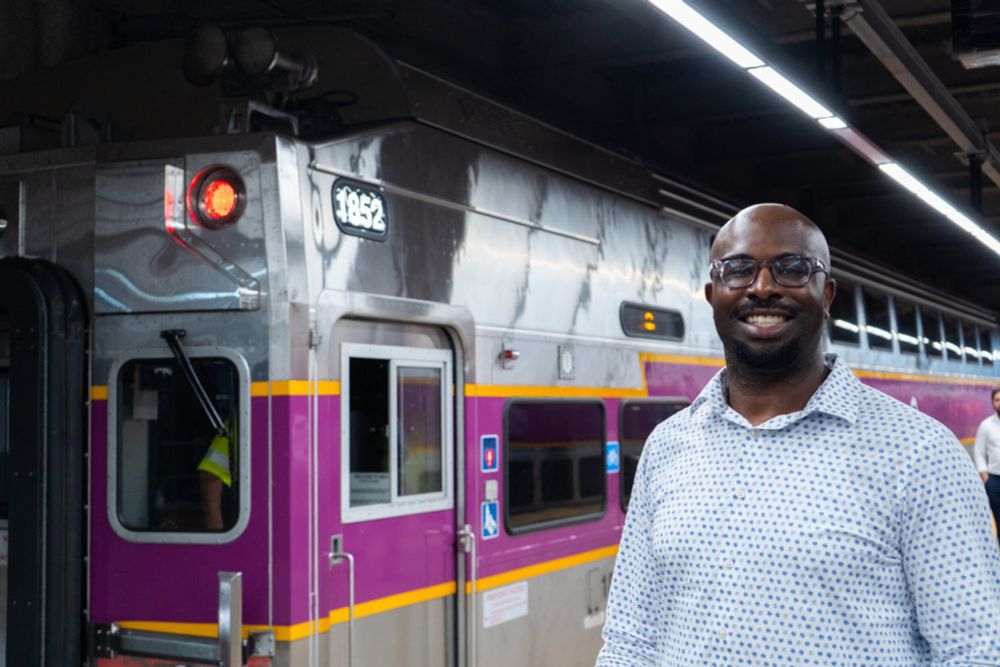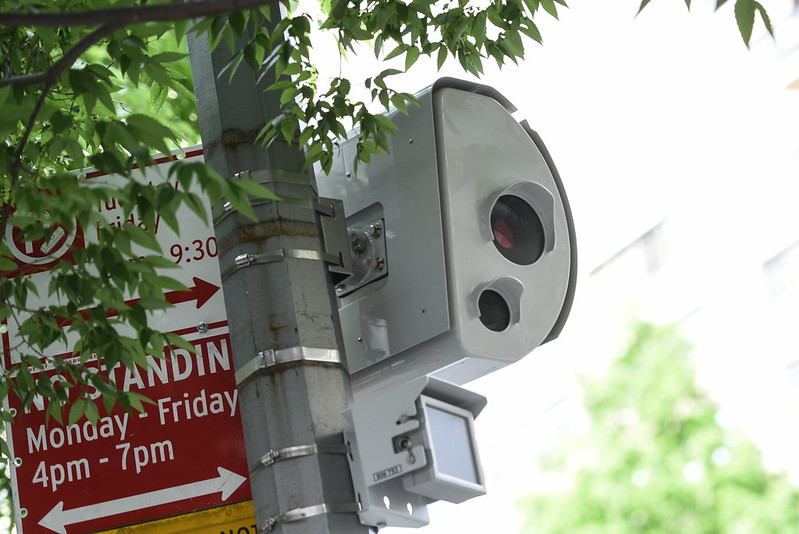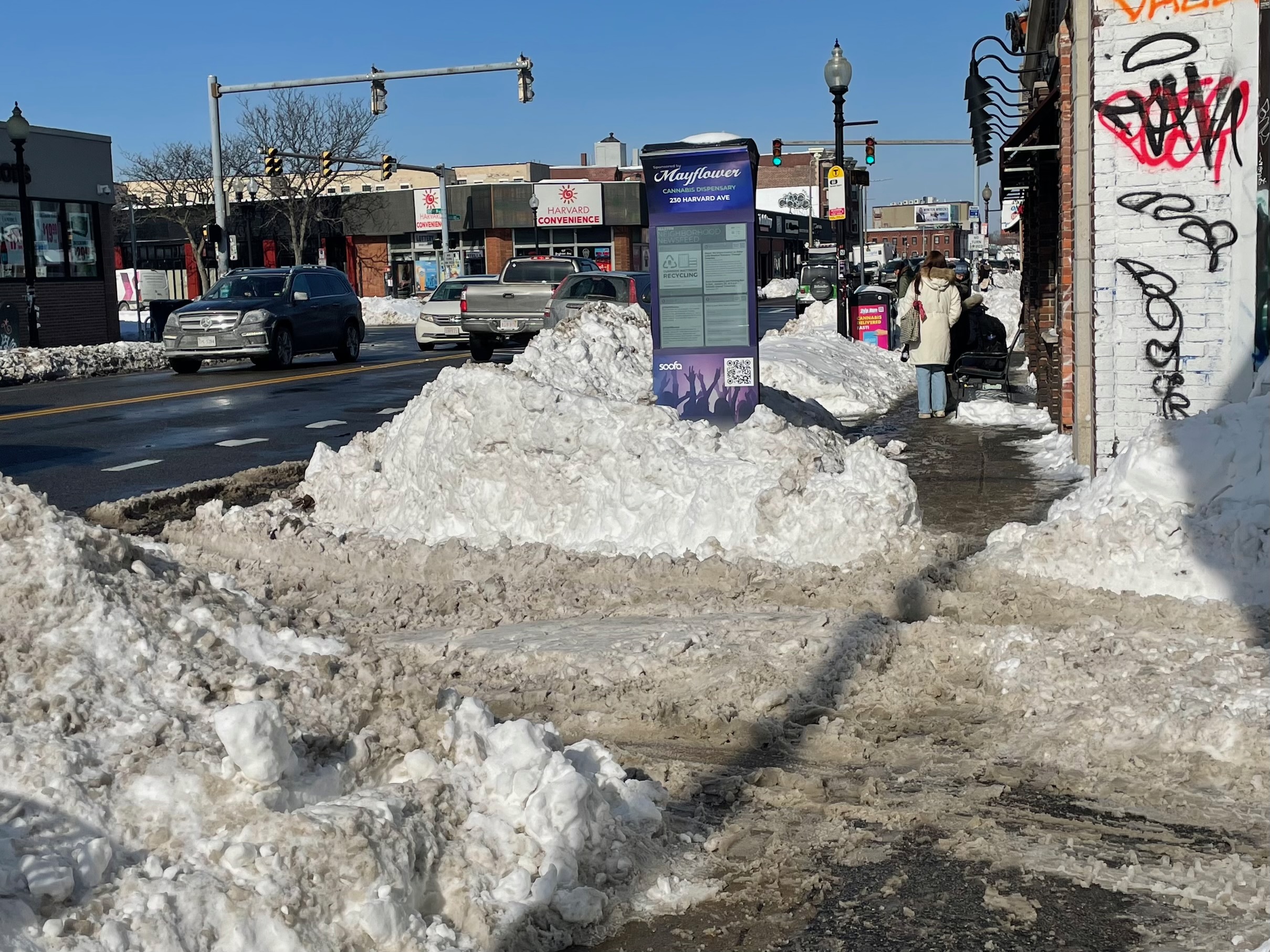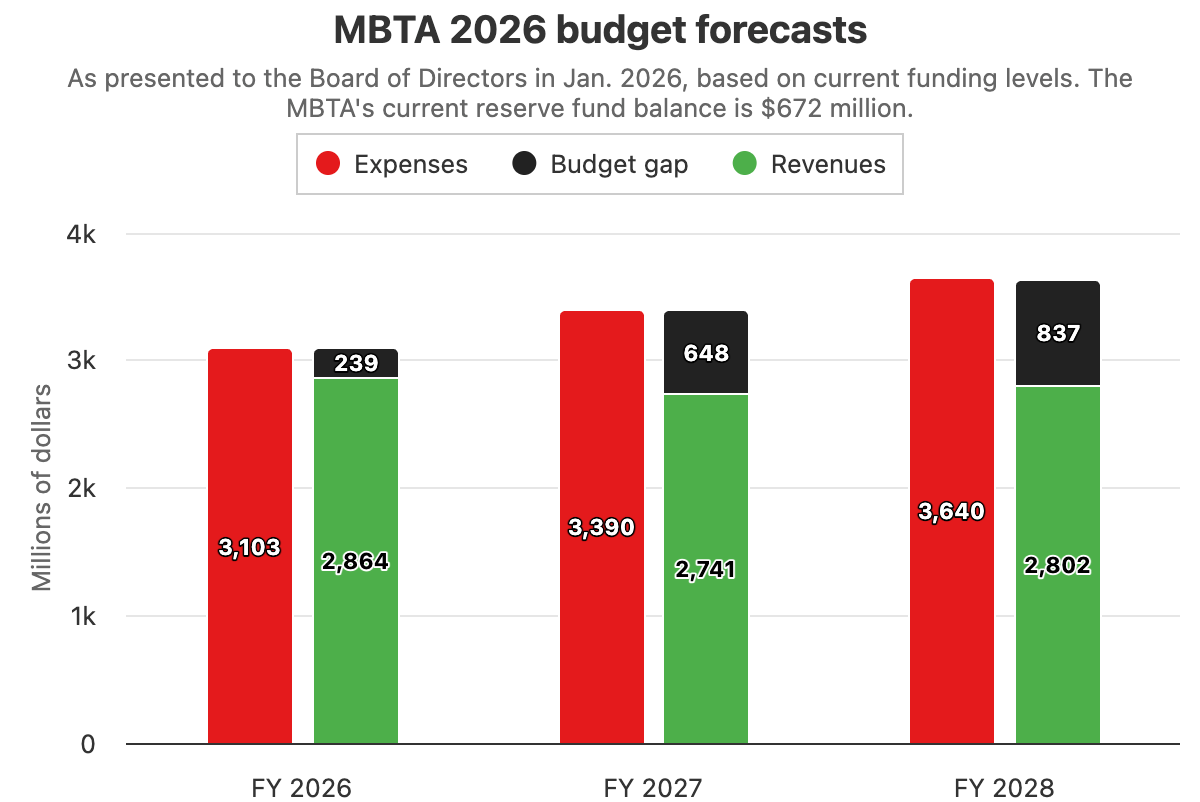This winter, Jarred Johnson gave up his role at the helm of the grassroots transit advocacy organization TransitMatters to take a new job leading the Boston office of Toole Design, a planning and engineering firm that specializes in designing safer streets.
Last month, StreetsblogMASS sat down with Johnson to discuss his six-year tenure with TransitMatters, his hopes for the future of the organization and of the MBTA, and his next career.
The following transcript of that conversation has been edited for length and clarity.
StreetsblogMASS: Looking back over the last few years, what are you most proud of accomplishing with TransitMatters, and for transit in general in the region?
Jarred Johnson: Getting regional rail to a point where we're actually moving forward on it. You know, some questions remain around funding and timeline – but this went from writing an op-ed saying that express trains on the Providence Line were not a great idea, to a full-fledged plan to electrify the system.
I think what's really neat is that it's also been this really interesting jumping-off point for us to think about other areas, right? We've tried to do a a better job of reaching out to to grassroots groups, and thinking about our gateway cities, and talking about fares as a part of this proposal. We've started thinking about bus service, particularly bus in the in the suburbs in the fringe of the system that's gonna connect to regional rail.
So I'm really proud of what we've been able to push the MBTA and and state leaders to do. I mean, it was in the governor's election campaign materials. So I'm excited about that, but also excited about sort of the ways that it pushed us as an organization, too.
StreetsblogMASS: So as an example of that – I know you're also very interested in housing issues. How do you think the discourse around like housing and inviting more housing near transit has changed during your tenure at TransitMatters?
Yeah, I mean if you told me that MBTA Communities (Act) was going to be passed, at the beginning of my tenure, I would have thought that was a crazy idea. So, yeah, we've seen a lot of TOD (transit-oriented development), and I think people have really grasped that it's an important part of how we begin to solve our housing shortage.
There was something that I feel like is really bubbling to the surface in some more recent research – and I'm thinking about the report we did with Boston Indicators – is that not only is building your transit going to help us solve our our housing crisis, but it's also gonna help us solve, in part, some of the T's financial challenges, right?
The T is a strong system and has some of the highest transit ridership and a real transit culture that few other cities in North America have. But the transit ridership on a per-mile basis is not nearly as strong as it could be.
And that's because we still have plenty of station areas that are zoned for industrial, or zoned for single-family residences. The pathway forward is building a lot more housing near transit.
StreetsblogMASS: South Coast Rail is opening this spring, and when that happens, somebody pointed out that this this will be the first time in over a decade where the MBTA will not have an active expansion project underway. But at the same time, you know, there's a massive $25 billion dollar repair backlog and there's a lot of funding uncertainty over the next few years.
How do you think the T should balance those competing priorities? Should the T be considering expansion projects like the Red-Blue connector? Or do you think it should remain more focused on what it's doing, the state-of-good-repair projects? What's the balance there?
I think balance is the name of the game, right? Like it's not one or the other. I think think about a project like the Red-Blue connector. It's great that it'll connect those two stations, but it's also about taking cars off the road from Cambridge to Logan Airport. It's about connecting people in East Boston to Kendall. But also, importantly, it's also about taking strain off of our incredibly crowded downtown transfer stations. Right? And so, when we try to sort of pit expansion projects versus state-of-good repair, as these totally separate things, we really miss the point, right?
And I'll get a little spicy here, but if the T was that important to lawmakers, it would have been fixed by now. Right? Still, you know, 75ish-percent of people commute on some way other than the T. And that is not sustainable for us to meet our climate change goals. It's going to make it really hard for us to to reach our housing goals without a shift in that.
We should also not necessarily think about expansion as something where it needs to be big and splashy, hard infrastructure, like a new commuter rail line. It's also expanding bus service and increasing bus service out to the fringes, and looking at gaps in the express coach network, where are the ways that we can use buses to extend the reach of our existing commuter rail and get more people on it?
Part of my theory of change is we've got to increase ridership and increase the political salience of the T if we really want to ensure that the T has the resources it needs to really thrive.
That reminds me how a lot of what the T is working on right now isn't really focused on building new infrastructure; it's about using the infrastructure that they already have and adding more service. The regional rail is about running more service on existing tracks. And bus network redesign is sort of similar – it's very not flashy, and politicians aren't cutting ribbons for the grand opening, but if you live near those routes, it's a pretty big deal.
We do need to figure out how to get politicians to care about less splashy projects like a new bus garage, because that's critical to increasing service capacity, or building a new turn track, because that's gonna allow for 30-minute eventually 15-minute service on a commuter rail line.
And I also think that we can't keep ignoring issues like what to do with the MBTA 1 bus, for example, you know, a ridiculously crowded bus route.
And the winner of the TransitMatters Pokey-Schleppy Award.
Right. And it travels on relatively narrow and politically-charged streets. Even if my main concern or really only concern is non-automotive traffic, you know, that is still an important car thoroughfare, right? And so we have to have a serious conversation about, what is the future of that?
Or the Tobin Bridge. We're not gonna increase the lane capacity on either side of whatever that new bridge will be, and it serves Chelsea, one of the densest communities in the country, certainly one of the densest communities in the country that doesn't have rapid transit yet.
So that has a potential to be a big project that we'll be cutting the ribbon on, and it also has the potential to be a project that frees up hundreds of buses and saves the T tons of money in operational costs in the long term.
Is that part of the conversation, to build a rapid transit line over the new Tobin Bridge?
I don't think so, but it should be.
If you talk about it, then it's part of the conversation.
Exactly right.
So a lot of what like TransitMatters has done in the past two or three years has been focused on the state-of-good-repair stuff, like the slow zone tracker, which had a huge impact holding the T accountable to fixing its tracks. You're not going to be there, but I wonder if you have like any opinions about what the organization should focus on next?
One of the things we did at TransitMatters a few years ago is work on our strategic plan, and think about what is the future of TransitMatters. What do we want to focus on? At some point regional rail will be underway and, you know, sure, we'll need to birddog that and we'll always have ideas and suggestions on how to make it better. But we'll have capacity that we can allocate to something else. And I really think it is this question of what is the T's future, and how are we pushing the T to really orient itself towards solving some of these major statewide challenges?
How do we get lawmakers and other policymakers to think of the T as a critical solve, right, for major challenges like housing, climate, congestion? Electric vehicles do nothing for congestion, and they don't necessarily help us solve sprawl. So we need electric vehicles, but we also need to have an equal, maybe even a larger effort to make sure that our decarbonization strategy doesn't purely rely on or even primarily rely on cars. Mode shift is this really important priority that we've really been circling on.
One of the things that we did as a part of our our strategic plan is we added climate to our mission statement. And we added economic resilience and and equity. And not just as buzz words, but as things that we think that transit can help us move the needle on.
Speaking of transations, what's what's next for you personally? What will you be working on for Toole Design?
I'm going to be working on Toole Design's planning team and help grow that team, and help move it more into transit. There have been some great Toole Design projects that include bus lanes and elements to support bus service, but we want to be even more engaged in in transit projects.
I'm thrilled about the fact that Toole is a woman-owned firm, but it's also a firm that's got 50-50 gender parity.
That's got to be unusual for an engineering firm, right?
Very unique, yeah. And race is that next frontier, right? So I'm really hoping to lean into that challenge of growing the pipeline and diversifying the field.
Are there any projects that they're working on that you're especially excited to get involved in?
Yeah. The Columbia Road action plan has been really exciting. Toole is doing something pretty cool with the co-design of streets and in really engaging residents a lot more deeply than a traditional planning process would do, and so I'm super excited about that. It's transit, it's walking and biking, its arts and culture – there are so many different elements, so I'm really excited about that project.
That covers all the questions that I'd prepared, but do you have any final thoughts to add before I let you go?
My hope for the space is that we don't take for granted the progress we've made. There's been "bikelash" or "bus-lash" in other places. And I think defending those those hard-fought victories is really important, right?
Because we know the benefits of those, and we know that it's benefited so many people who have often been at the losing end of so many different transportation decisions.
And we also know that that this isn't a zero-sum game where higher-income people have to lose in order for low-income folks to gain something. Our streets are safer now, and that benefits everyone.
I see politicians and pundits fixating on bike lanes or bus lanes, but the actual problem is there are too many cars, and they're causing too many crashes.
What are the real meaningful ways that we're going to bring order to the streets and make them safer and tackle congestion? Because removing a bus lane doesn't fix that underlying problem. Until we're able to really address the core root to the issue – too many cars, and not enough space for them – we're always going to be just sort of shuffling deck chairs.






